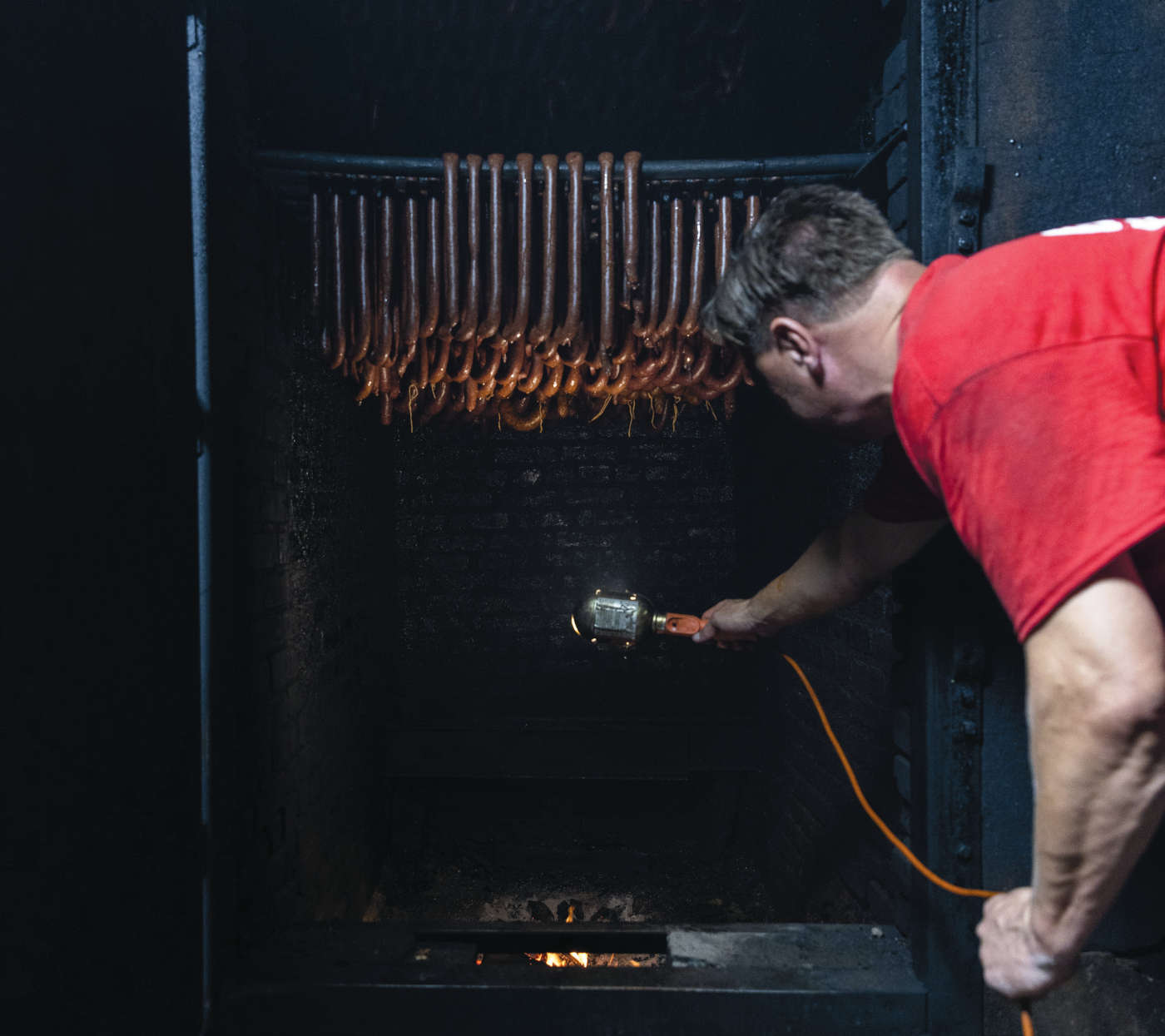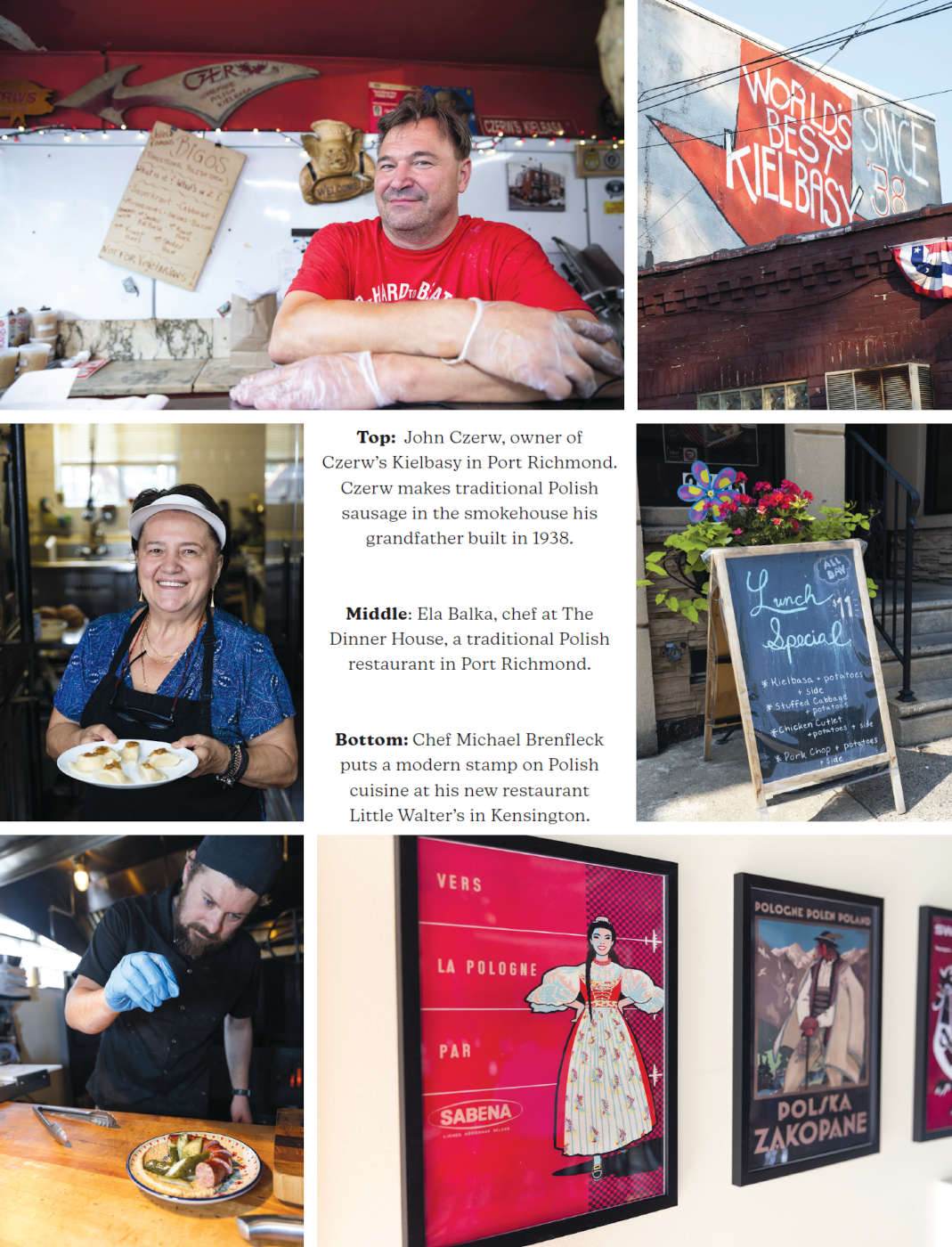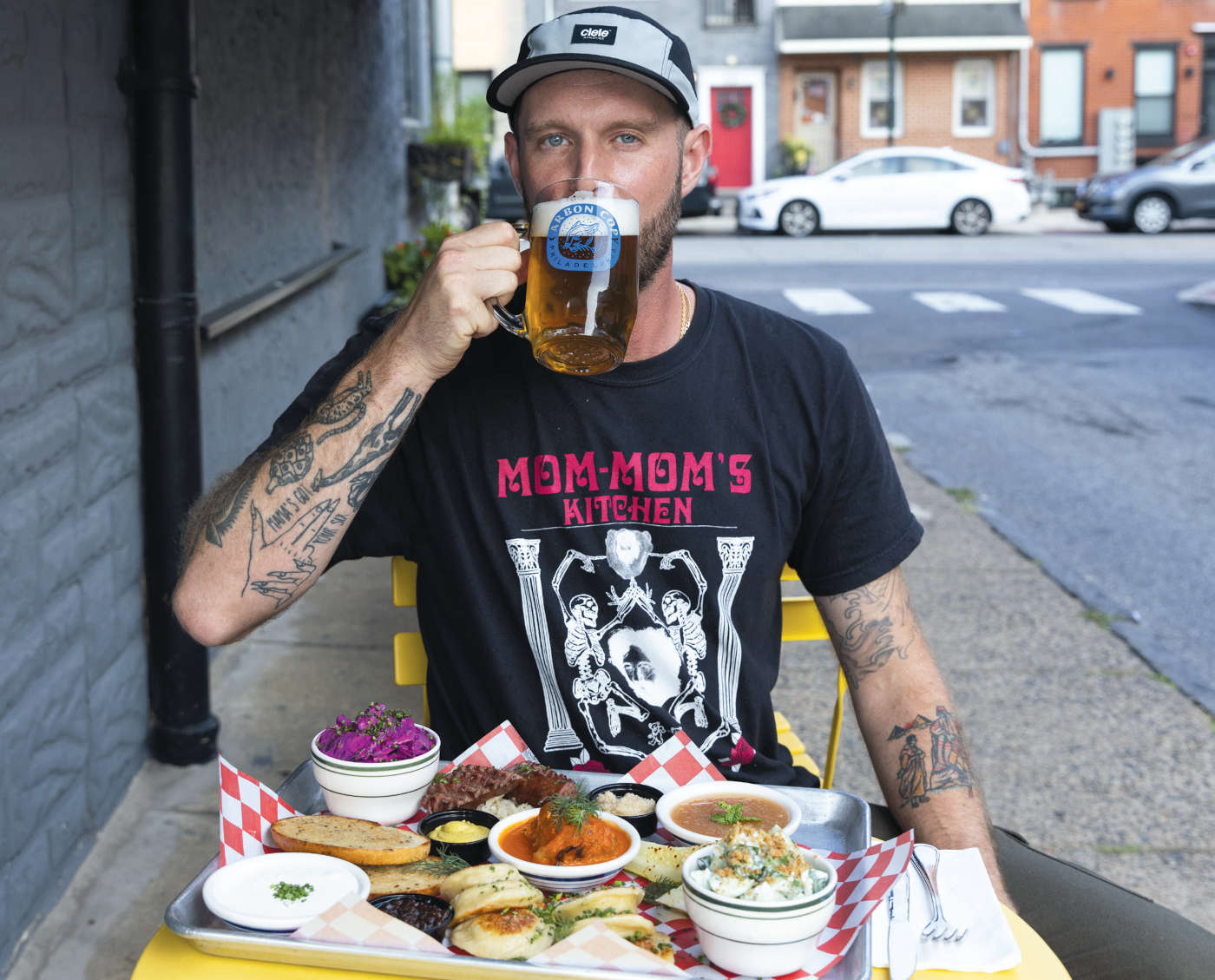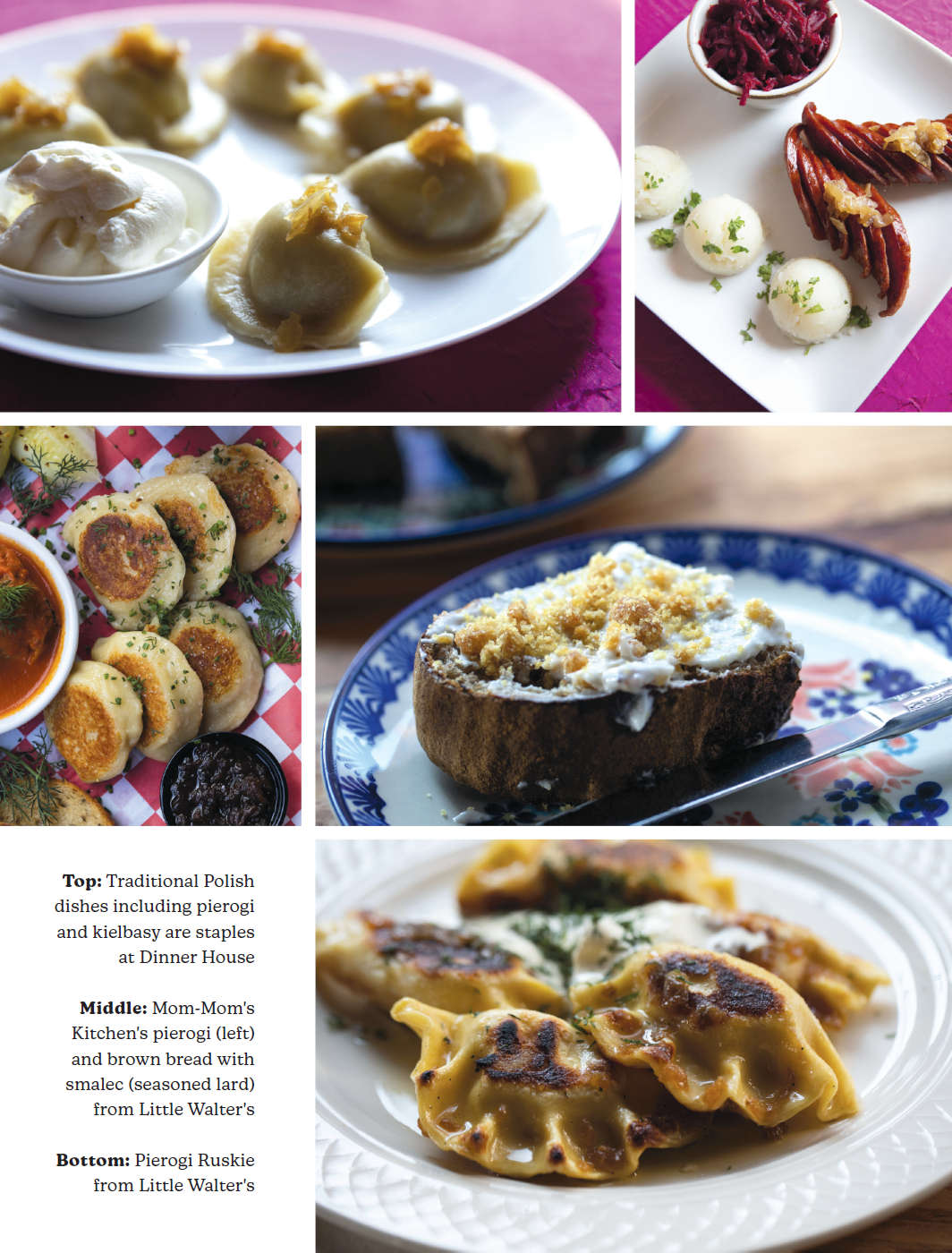Pierogi: Past, Present and Future
It’s 4am and all is quiet on Tilton Street, except for the early-morning smoke rising from the building in the middle of the block. John Czerw is at his namesake Port Richmond sausage shop Czerw’s Kielbasy. He seals pierogies, stuffs and wraps cabbage leaves for Golumpki (stuffed cabbage), and starts the fire to smoke traditional Polish sausage with his family recipes passed down through generations.
The sausage will be smoked and heated over seasoned cherry and applewood, the casings stuffed with the freshest ingredients. The kielbasa is smoked in the same smokehouse Czerw’s grandfather built with his hands in 1938. The traditional kielbasa, kishka (blood sausage), and kabanosy will be ready for customers at 8:30am.
Czerw’s hospitality is legendary in Philadelphia. Customers say that though the line can sometimes be a city block long, when you finally get through the door, it’s like you are the only one in the room.
“I appreciate all the customers. It’s easy to be nice because I have the best customers,” says Czerw, a third-generation Polish American. Czerw’s is one of many Polish American food institutions in a city where Polish food has always been a part of food culture.
Just as with cheesesteaks and water ice, everyone has their favorite pierogi or kielbasa purveyor and the options are plentiful. In a single day, you can stock your pantry with sweet plum jams known as Powida and raspberry and gooseberry syrups at the Polish market, grill the freshest kielbasa from Czerw’s or Swacki’s, take in rich Polish history in Old City, and end the day by digging into a plate of hand-crimped pierogies.


According to Michael Blichasz, director of the Polish Cultural Center in Old City, there are 875,000 people who identify as Polish in Pennsylvania, and around 100,000 Polish-identifying people in the Philadelphia area.
“People will say ‘I’m Polish; I’m fourth generation, but I’m still Polish American,’” says Blichasz. He thinks Polish identity is more about participating in the customs, traditions, and culture than how long ago your family emigrated. The Polish Cultural Center welcomes around 80,000 visitors a year and hosts the annual Pulaski parade every October.
A good example of Polish hospitality is how they make a toast. It’s traditional to say “stolat!” as glasses clink. The word translates to “100 years,” and it’s a way to wish others good fortune and longevity. “People just can’t get enough of it,” Blichasz says.
Polish culture has always been strong in Philadelphia and continues to evolve today. From the restaurants that have been serving Polish food for decades to new generations of chefs and entrepreneurs working to keep Polish food alive, Philly is a place where you can take in Polish culture in a day and travel to Poland without ever leaving the city.

“Every pierogi is a person,” says Ryan Elmore. “Everyone has their own signature pinch, and everyone does it a little differently. It’s the finished product that matters.”
PIEROGI CITY
When you crimp a pierogi, you seal decades’ worth of history into a simple dumpling. In Philadelphia, there are more than a dozen places to find a good pierogi, a Polish dumpling that features a savory or sweet filling such as potato and cheese, farmers’ cheese, summer berries, and a Philadelphia pierogi innovation: cheesesteak.
“I don’t know where we would be if we weren’t in Philadelphia. Philly is a foodie city that is highly critical. People in the neighborhood will let me know if there is too much or too little filling,” says Marie Thorpe, owner and chef of The Pierogie Kitchen in Roxborough.
Her team makes 200 to 400 dozen pierogies a day. “It was a dying art when I started 25 years ago; there was no one doing it anymore. It’s really nice to see how people are representing our culture.”
When Thorpe’s great-grandparents came from Poland, they were told, “Go find Manayunk,” which is where a large community of Poles settled at the time. She grew up making pierogies with her grandma giving every dumpling her stamp of approval.
Like Thorpe, Ryan Elmore, co-owner of Mom-Mom’s Kitchen, says he and Kaitlin Wines are trying to keep a dying cuisine alive. Elmore says that it is a myth that Polish food should be cheap; he believes that the work that goes into pierogies should be valued as it is with other fine pastas and dumplings.
“Every pierogi is a person,” says Elmore. “Everyone has their own signature pinch, everyone does it a little differently. It’s the finished product that matters.” Mom-Mom’s started as a Polish food truck in Bridesburg, and later moved to South Street. Elmore says they are now coming full circle by returning to Port Richmond to serve pierogies and other Polish food in the space of the old Lunar Inn alongside Carbon Copy Brewing.
Mom-Mom’s serves a variety of pierogies and also sells kielbasa, traditional Polish soups like Zurek (sour rye soup), and Bigos (Hunter’s Stew). For their Bigos, usually sold in winter, Elmore and Wines use hearty ingredients like bacon pork shoulder, fresh kielbasa, smoked kielbasa, fresh mushrooms, prunes, and rinsed sauerkraut cooked down in a dark beer, usually Yards Brawler.
Chefs making Polish food in Philly today say that though the cuisine was typically seen as peasant food, it is much more than fuel for long workdays. According to those who make it, Polish food deserves to be showcased because of its signature balance of sour, sweet, tangy, and smoky flavors. Polish techniques, such as lacto-fermentation and nose-to-tail cookery, are also worthy of celebration.

A NEW GENERATION OF POLISH AMERICAN CHEFS
Chef Michael Brenfleck insists Polish food is for sharing with friends and family. At his new Kensington restaurant, Little Walter’s, Brenfleck cooks traditional Polish food with a local twist.
“I wanted to make Polish food in the style of Philly by having vegetarian and vegan food. Do we love pork? Absolutely! Is there a pig on our sign? Yes!” says Brenfleck. But he also created a vegan squash blossom pierogi that’s rooted both in Polish food traditions and modern Philadelphia food culture.
Little Walter’s menu ranges from seasonal vegetables and local pickled vegetables, to bacon fat rendered butter known as Smalec, to traditional chicken cutlets and pork chops. The drink program features classic Polish drinks that highlight ingredients like sour cherries and bison grass vodka.
Brenfleck says he will always have a vegan pierogi option, and notes he makes his kielbasa in-house. He hopes to re-create that warm feeling for guests that he remembers from many Polish Christmas Eve celebrations or the satisfaction he felt when eating a plate of pierogies at his friend’s house as a kid.
“Unless you go to [the Polish restaurant] The Dinner House or someone’s home, it’s hard to find what Polish food is supposed to be. How do we bring something modern to the city when people don’t even know what it’s supposed to be?” says Patrick Alfiero, owner and chef at Heavy Metal Sausage, a James Beard–nominated meat producer and butcher in South Philadelphia.
Alfiero’s grandfather came from Poland. Spending time on his grandfather’s farm was formative. Alfiero makes his own kielbasa, headcheese, and other Polish sausages according to the season. For Alfiero, working to keep traditions alive before they get lost is key.
For those who want to cook Polish food at home, a wide assortment of Polish grocery stores in Philadelphia are worth visiting to stock up on items for traditional Polish meals. Shops in Port Richmond like Polka Deli and Polmart have a wide assortment of imported products, including farmers’ cheese called Twarog, Polish dill pickles, plum, cherry and gooseberry jams, fresh rye bread, imported cheese, and Polish chocolate—which is often filled with brandy. There is also cow-milk fudge.
The best part of shopping at a Polish grocery store is that most items can be eaten individually or part of a larger spread with smoked cheese, kielbasa, and fresh vegetables.
For Czerw, visiting and shopping at the Polish stores in Port Richmond means supporting the local businesses and keeping culture and memory alive. “My grandparents lived to be 90 eating this stuff,” he adds.
Mom-Mom’s Kitchen and Polish Food Cart
3124 Richmond St.
215.613.7781
mommomnomnom.com
The Dinner House
2706 E. Allegheny Ave.
267.596.7727
Polmart Polish Grocery Market
2712 E. Allegheny Ave.
215.291.9057
Czerw’s Polish Kielbasa
3370 Tilton St.
215.423.1707
Little Walter’s
2049 E. Hagert St.
267.239.2228
littlewaltersphilly.com
Heavy Metal Sausage
527 W. Porter St.
heavymetalsausage.com
Polish American Cultural Center Museum
308 Walnut St.
215.922.1700
polishamericancenter.org




